Mieczysław Weinberg: Music for Orchestra
Catalogue No: TOCC0193
EAN/UPC: 5060113441935
Release Date: 2014-07-07
Composer: Mieczysław Weinberg
Artists: Dmitry Vasilyev,
Siberian Symphony Orchestra,
Veronika Bartenyeva
Mieczysław Weinberg, born in Warsaw in 1919, became a close friend of Shostakovich in Moscow, after fleeing eastwards before the invading Nazis in 1939. His style has much in common with Shostakovich's: fluent contrapuntal skill, a keen feeling for melody, often inflected with Jewish cantilena, and an acute sense of drama which combines a natural narrative manner with an extraordinary ability to create atmosphere. Since his death in 1996, his vast output — which includes 26 symphonies, seven operas and seventeen string quartets — has enjoyed increasing recognition as some of the most individual and compelling music to have been composed in the twentieth century. This recording pairs an early orchestral work, the suite Polish Tunes of 1950, with the last full orchestral symphony he was to complete, dedicated to the memory of those who died in the Warsaw Ghetto.
Veronika Bartenyeva, soprano
Siberian Symphony Orchestra, orchestra
Dmitry Vasilyev, conductor
Listen To This Recording:
-
Polish Tunes, Op. 47, No. 2 (1950)
- I Adagio – Allegro
- II Andantino
- III Allegro
- IV Allegro moderato
- Largo –
- Allegro molto –
- Largo –
- Presto –
- Andantino –
- Lento
Symphony No. 21, Op. 152, Kaddish (1991)
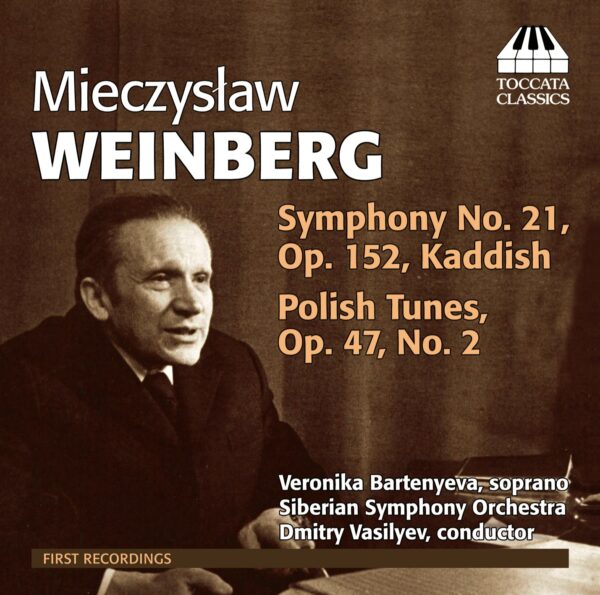
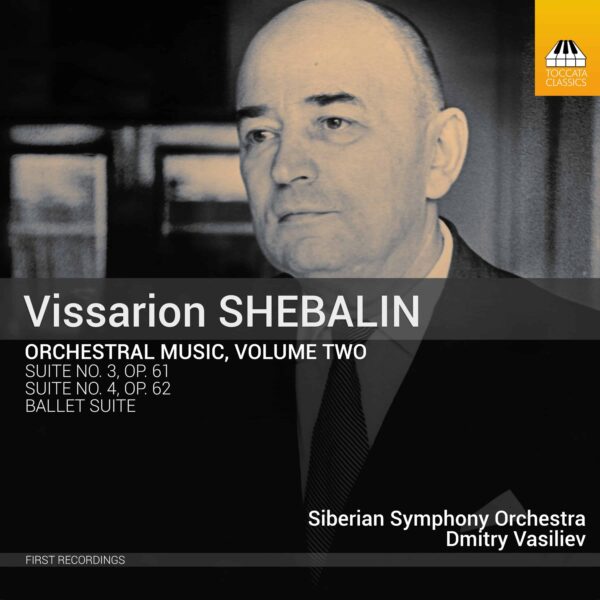
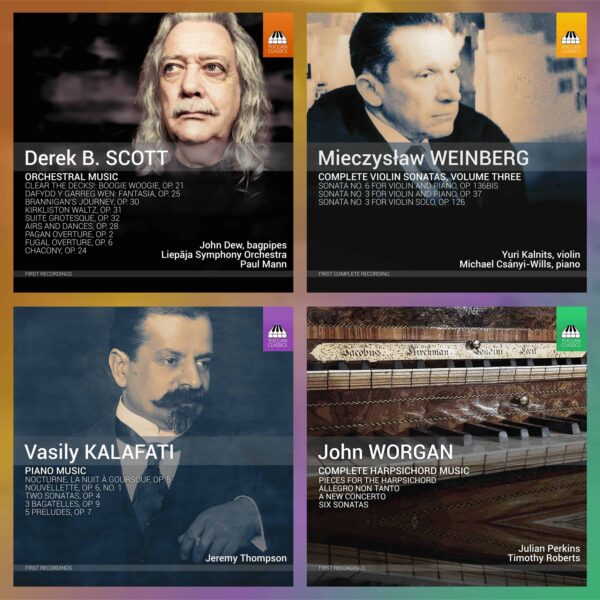
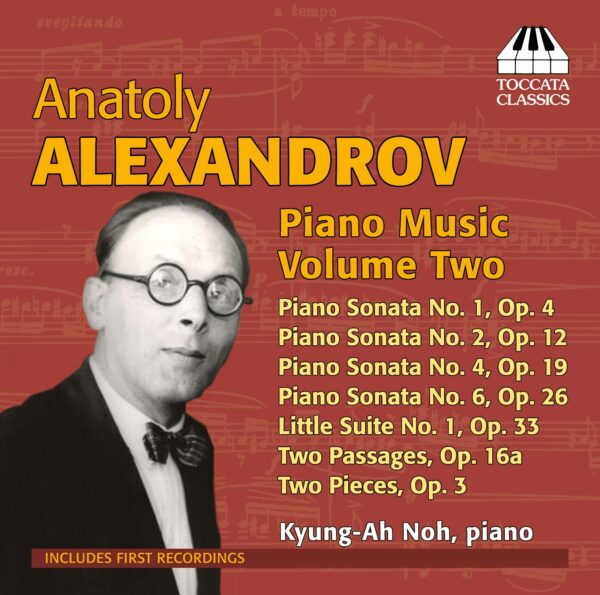
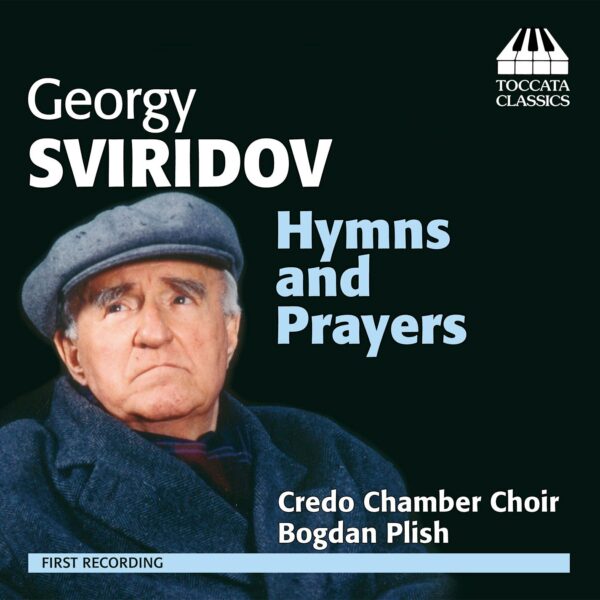
Norman Lebrecht :
‘Two world premieres by a favourite composer is not something that lands on my deck every week. … [Polish Tunes Op. 47, No. 2] It is as much Jewish as Polish and the melodies are irresistible – just made for dancing, but with an ironic subtext. … The Siberian Symphony Orchestra, conductor Dmitry Vasilyev, play as if their lives depend on it and the sound in the Omsk Philharmonic Hall is immaculate.’
—Norman Lebrecht, Sinfini Music
BBC Radio 3 :
‘I know I want to hear the rest of it after that opening. […] Pretty creditable all round, the performance […] and the recording is very good as well. […] Good booklet notes from David Fanning as well.’
—Andrew McGregor and Stephen Johnson, BBC Radio 3
The Classical Reviewer :
‘…first on this new disc is a work from 1950, his Polish Tunes, Op.47, No.2. …This is an attractive work, light in feel but full of good humour. Weinberg’s Symphony No.21, Op.152, Kaddish, composed between 1989 and 1991, is another matter, a deeply serious paean to the victims of the Warsaw Ghetto and dedicated to them. …This is an important addition to the Weinberg discography. Dmitry Vasilyev and the Siberian Symphony Orchestra do a tremendous job… If you have the slightest interest in Russian music of the 20th century then this disc is a must.’
—Bruce Reader, The Classical Reviewer
MusicWeb International :
‘…It’s truly incredible that works as excellent as these are being recorded for the first time. …[Polish Tunes, Op. 47, No. 2:] there is no shortage of appealing folk-inspired melodies in this fresh and uplifting music. …Symphony No. 21, Op. 152 is titled ‘Kaddish’ referring to the Jewish prayer service for the dead. …Bold and unsettling, almost sinister in character, the Allegro molto section has a swirling, driving momentum. The brass playing is especially striking in writing of a conspicuously martial quality with heavy and relentless percussion. …A fascinating feature that noticeably softens the emotional tension is the inclusion of a wordless soprano at 2:45-7:51 and 10:34-11:06 here performed by Siberian Veronika Bartenyeva. This was my first experience of hearing the Siberian Symphony Orchestra (Omsk Philharmonic) who under the reliable baton of principal conductor Dmitry Vasilyev excel in this wonderful and inexplicably neglected music. The Symphony makes compelling listening with Vasilyev’s unfailing instinct producing assured orchestral playing of striking directness. The engineers provide clear sound with a natural and realistic balance. This important release from Toccata Classics comprising first recordings of Weinberg’s orchestral music has exceptional appeal.’
—Michael Cookson, MusicWeb International
Gramophone :
‘… [Polish Tunes are] skilfully orchestrated and sunny of disposition. … [Symphony No 21]: It is a striking, viscerally anguished, emotionally powerful piece as this fine performance by the Siberian Symphony Orchestra under Dmitry Vasilyev underlines. Lament, rage, defiance, horror and numbness are all drawn into the music’s expressive spectrum, with achingly poignant references to Chopin’s G minor Ballade and a final section deploying a soprano voice (Veronika Bartenyeva) in a wordless Requiem. Weinberg’s is a forceful voice in this symphony; its impact is overwhelming.’
—Geoffrey Norris, Gramophone
Gijs van der Meijden :
Weinberg’s 21st Symphony is a very spare and desolate work, comparible, both in content and in significance, with such works as Shostakovich’s 15th Symphony or 15th String Quartet. A most unsettling listening experience, and in quite great contradiction to his Chamber Symphonies 1-3 (which are not completely original works, but reworkings of several early String Quartets). The performance here is, however difficult it is to judge a single performance with regard to expressing the composers intentions the right way round, a very convincing one, made with sincere commitment and delicacy, making the work a convincing whole, something which is not easy within one so big single span (at 53 minutes about the longest as yet recorded Weinberg symphony) containing music of so many different ‘faces’. The sound is very good indeed, allowing the various details of the score to be heard in a clear, convincing and realistic way. The ‘Polish Tunes’ preceding the Symphony are a much earlier work in the ‘public/realistic’ vein, but as such, as usual with Weinberg, not less sincerely meant. A pleasant enough work, but the shock of hearing the 21st after this rather sunny work is quite big! History is cruel, and has relegated Weinberg’s oeuvre to the shades. Immense thanks therefor to the performers committing themselves to this important composer, unearthing yet another part of his work. Likewise, great thanks to Toccata who, along with Naxos and (hopefully still) Chandos have taken up the task of presenting a (hopefully ultimately complete) survey through this fascinating composer’s symphonic oeuvre. Liner notes are, as usual with Toccata, both extended and very worthwhile, here written by Weinberg expert David Fanning. Possible further releases with other Weinberg orchestral works would be most welcome; clearly his cycle of symphonies is as important and varied as that of his friend Shostakovich (and, in my private opinion, rather greater than that of someone like Prokofiev!). Until then, this CD and the other Toccata releases of chamber works are already much cherished!
Paul Pieters :
Dear Martin, Dear David I have received a few days ago the new CD with Weinberg’s 21st symphony. I have already listened a couple of times to the entire symphony, and I find it a masterpiece. I want to congratulate Martin for bringing it out, and David for the very detailed booklet text. I obtained my very first Weinberg CD years ago. It was an OLYMPIA with some string quartets (still with the spelling VAINBERG), and I was immediately very impressed by it. By now I have about 40 Weinberg CDs and I am still a great fan. I was also pleased to see that David took over the task of writing the booklets after the passing away of Per Skans, first in the CPO quartet series, and now in the Toccatas. I am now awaiting the continuation of the Violin Sonatas. Keep up the good work Greetings
Classical Net :
‘In both works Dmitry Vasilyev draws fine performances from the Siberian Symphony Orchestra, an ensemble that sounds quite talented collectively, totally unlike some of the unpolished orchestras that appeared on countless Soviet-era recordings in the 1960s and 1970s. The orchestra is known within its own borders as the Omsk Philharmonic, and can be found more easily under that name on the web. Toccata Classics offers excellent sound reproduction and very enlightening notes by David Fanning. Recommended.’
—Robert Cummings, Classical Net
BBC Music Magazine :
‘The Siberian Symphony Orchestra relish its moments of virtuosity, delivering supple playing [Polish Tunes] and a level of commitment which is maintained in the more complex writing of Symphony No. 21.’
—Erik Levi, BBC Music Magazine, December 2014
Fanfare magazine :
‘The Symphony No. 21 is a different matter: This is a 54-minute, one-movement work (with six subdivisions of tempo) of profound depth and power. […] Weinberg’s superb musical mind was able to expand both the feelings of loss (which he himself experienced) and the interplay of musical materials to produce a work much in the same vein as Górecki’s Symphony No. 3 (albeit in a different style). […] Weinberg was, simply, too good a composer to lapse into poor taste, regardless of his depth of feeling. […] Soprano Bartenyeva [sings] with a fine tone and great musical sensitivity. The symphony ends quietly, almost muted.’
—Lynn René Bayley, Fanfare magazine, November/December 2014
music-weinberg.net :
‘While Gražinytė-Tyla’s account is certainly accomplished, it is ultimately Vasilyev’s more sharply-etched version that is preferable, due, not least, to the Siberian conductor and orchestra’s superior ability to convey the depth of Weinberg’s monological narrative, whether it passes through pronounced Jewish folk-themes, various harmonic explosions, or moments of focused inwardness. Ultimately, this also translates into an ability to more poignantly convey the element of prayer that is so strongly inherent in the whole work.’
—music-weinberg.net
MusicWeb International :
‘2014 Recording of the Year
This welcome release from Toccata Classics comprises of two Weinberg orchestral scores that are being recorded for the first time. This was my first experience of the Siberian Symphony Orchestra who under the reliable baton of principal conductor Dmitry Vasilyev excel in this wonderful and inexplicably neglected music. The ‘Kaddish’ Symphony makes compelling listening with Maestro Vasilyev’s unfailing instinct producing assured orchestral playing of striking directness.’
—Michael Cookson, MusicWeb International
International Record Review :
‘A notable release that Toccata could profitably follow up with the 22nd symphony and the early symphonic poem thereby making available the alpha and omega of Weinberg’s extensive orchestral output.’
—International Record Review
Sinfini Music :
‘CD OF THE WEEK
Two world premieres by a favourite composer is not something that lands on my deck every week. […] The Siberian Symphony Orchestra, conductor Dmitry Vasilyev, play as if their lives depend on it and the sound in the Omsk Philharmonic Hall is immaculate.’
—Sinfini Music